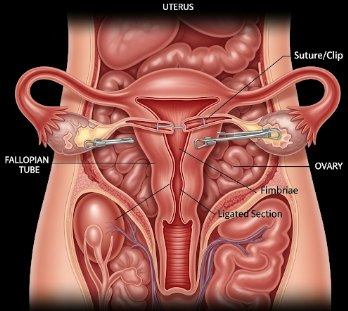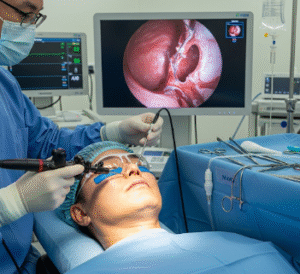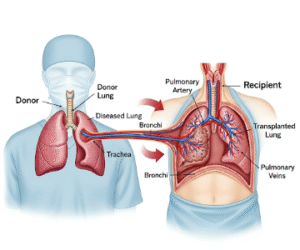Overview
Tubal ligation, also known as female sterilization, is a permanent contraceptive procedure that blocks or seals the fallopian tubes to prevent pregnancy. By preventing the egg from traveling from the ovaries to the uterus, fertilization is no longer possible.
In Korea, tubal ligation is offered at specialized gynecology and reproductive health centers using minimally invasive laparoscopic techniques, ensuring safe, effective, and low-complication procedures.
What is Tubal Ligation?
Tubal ligation is a surgical method for permanent birth control. It is generally recommended for women who:
- ✦ Do not wish to have more children
- ➤ Want a long-term, reliable contraception option
- ✦ Have medical conditions where pregnancy could be high-risk
Methods of tubal ligation include:
- Laparoscopic clipping, cauterization, or banding of fallopian tubes
- Mini-laparotomy (small abdominal incision, sometimes during cesarean)
- Hysteroscopic tubal occlusion (non-incisional approach)
What are the Benefits?
✅ Highly effective permanent contraception (>99%)
➤ Avoids the need for ongoing hormonal or barrier methods
✅ Minimally invasive options with quick recovery
➤ Can be performed immediately after childbirth (postpartum sterilization)
✅ Does not interfere with hormonal cycles
➤ Reduces risk of unintended pregnancy
Procedure Details
1) How should I prepare for Tubal Ligation?
- ✦ Medical evaluation: blood tests, pelvic exam, and medical history review
- ➤ Discuss contraceptive goals with your doctor to confirm suitability
- ✦ Fasting: no food or drink for at least 6–8 hours before surgery
- ➤ Stop certain medications as advised (e.g., blood thinners)
- ✦ Arrange post-procedure care, as minor discomfort may occur
2) What happens during the procedure?
- ✦ Usually performed under general anesthesia
- ➤ Laparoscopic approach: small incisions made in the abdomen
- ✦ A camera and instruments are inserted to access the fallopian tubes
- ➤ Tubes are clipped, cut, banded, or cauterized to prevent egg passage
- ✦ Procedure takes approximately 30–60 minutes
- ➤ In postpartum cases, mini-laparotomy may be performed immediately after cesarean
3) What happens after Tubal Ligation?
- ✦ Recovery: Most patients go home the same day (laparoscopic)
- ➤ Mild cramping, bloating, or shoulder tip discomfort may occur
- ✦ Normal activities can usually be resumed in 1–2 weeks
- ➤ Follow-up appointment ensures proper healing and confirms tubal closure
- ✦ Pain medications and light activity restrictions are typically recommended
Risks / Benefits
Possible Risks:
- Infection at incision site
- Bleeding or internal injury (rare)
- Postoperative pain or cramping
- Ectopic pregnancy if sterilization fails (very rare)
- Reaction to anesthesia
Benefits:
- Permanent, highly effective contraception
- Avoids the need for daily birth control
- Safe with modern laparoscopic techniques
- In Korea, skilled surgeons reduce complication rates and provide minimal scarring
Recovery and Outlook
- ✦ Recovery is generally quick: 1–2 weeks for most activities
- ➤ Full abdominal recovery may take 3–4 weeks
- ✦ Does not affect hormonal cycles or sexual function
- ➤ Most women experience immediate peace of mind regarding contraception
- ✦ Korean hospitals offer post-procedure monitoring and counseling for long-term reproductive health
When To Call the Doctor
⚠ Signs of infection: fever, redness, or discharge at incision
⚠ Severe abdominal pain not relieved by medication
⚠ Excessive bleeding
⚠ Unexpected complications like vomiting or dizziness
Best Korea Option / Process
Korean hospitals provide world-class gynecological surgery and reproductive health care, including:
- ✦ Minimally invasive laparoscopic tubal ligation
- ➤ Postpartum sterilization options after cesarean or vaginal birth
- ✦ Experienced gynecologists and anesthetists
- ➤ Quick recovery with day-surgery facilities
- ✦ Affordable treatment packages with international patient support
- ➤ Follow-up care including ultrasound confirmation if necessary
Highlights of Tubal Ligation in Korea
- ✅ Permanent, highly effective contraception
- ➤ Minimally invasive with fast recovery
- ✅ Does not interfere with hormonal cycles
- ➤ Safe procedure with low complication rates in Korea
- ✅ Skilled surgeons and advanced post-operative care













